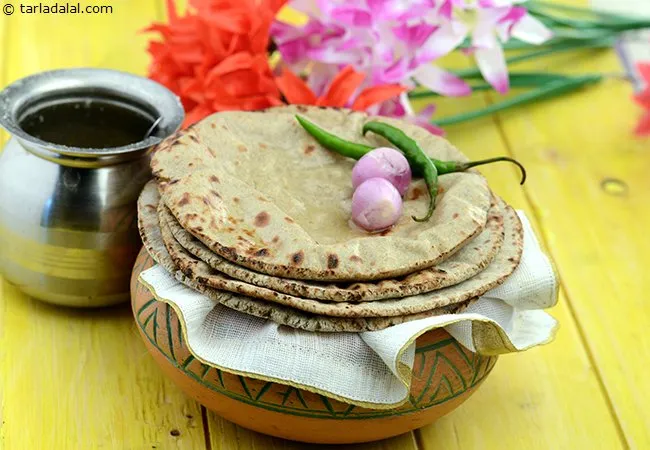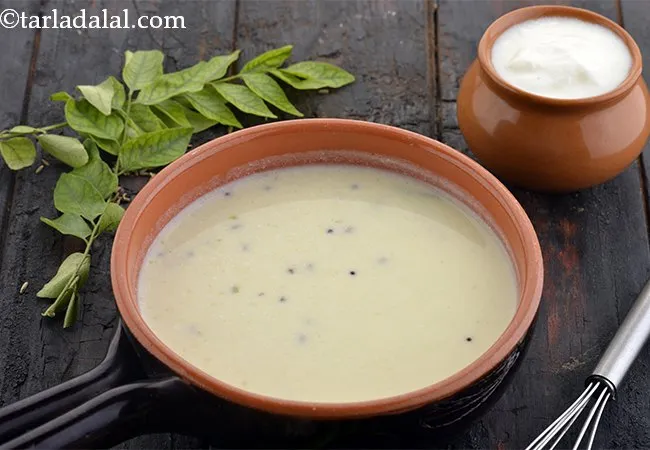Calories in Gujarati Toovar Dal Sweet And Spicy Recipe
This calorie page has been viewed 9833 times

Table of Content
How many calories does one serving of Gujarati Toovar Dal have?
One serving of Gujarati Toovar Dal gives 144 calories. Out of which carbohydrates comprise 87 calories, proteins account for 19 calories and remaining calories come from fat which is 38 calories. One serving of Gujarati Toovar Dal provides about 7 percent of the total daily calorie requirement of a standard adult diet of 2,000 calories.
Click here to see Gujarati Toovar Dal recipe. A satiating dal with an interesting sweet, little spicy and tangy flavour, the Gujarati Toovar Dal is a homely dish that will remind you of mom any time, any where! A tempering of whole spices adds a lot of punch to this dal recipe, while tomatoes add enough tang and jaggery imparts a pleasant sweetness to it. Despite its simplicity and homeliness, the Gujarati Toovar Dal has a well-rounded and exciting flavour – so much so that a bowl of rice or a couple of rotis with a cup of this dal will make a nice, satisfying meal!
Serve this dal with rice, but it pairs of well rotis and parathas too.
Bajra Roti
Is Gujarati Toovar Dal healthy?
Yes, This is healthy Dal recipe. But restrictions applicable to some.
Let's understand the Ingredients of Gujarati Toovar Dal.
What's good in Gujarati Toovar Dal.
Toor Dal (tuvar dal, arhar dal, toovar dal) : Toor dal is rich in proteins, the building block of good health. It is High in fiber and diabetic and heart friendly also. Being an excellent source of folic acid, pregnant women must include toor dal in their daily diet. Being an excellent source of fibre it helps in preventing and relieving gastric problems like constipation. See detailed benefits of toor dal.
Turmeric Powder (Haldi): Turmeric helps in digestion of food thus helping to overcome indigestion. Haldi may help in reducing the growth of fat cells in the body. Turmeric, being rich in iron, is highly valuable in the treatment of anaemia and both the root as well as the powder should be a regular part of an anaemic diet. One of the health benefits of turmeric is it’s anti-inflammatory property due to the active compound, Curcumin, which helps to relieve inflammation of the joints and thus is a ladder to relieve pain related to arthritis. The curcumin in haldi also helps to ward of the bacteria’s causing cold, cough and throat irritation. Turmeric benefits in diabetes management by lowering blood glucose levels. Its antioxidant and anti-inflammatory effects are useful in the treatment of diabetes patients. It is known to be a good brain food and keep diseases like Alzheimer’s at bay. See here for detailed turmeric benefits.
Green Chillies : Antioxidant vitamin C in green chillies protects the body from effects of harmful free radicals and prevents stress. It is probably the high fiber which helps in controlling blood sugar levels. This it is a welcome addition to a diabetic diet. Suffering from anaemia? Add green chillies to your list of iron rich foods too. For complete details see benefits of green chilli.
Ginger (Adrak) : Ginger is an effective cure for congestion, sore throat, cold and cough. It aids digestion and relieves constipation. Ginger was found as effective as drugs in relieving menstrual pain. Ginger is effective in decreasing the cholesterol levels in patients with high cholesterol. Ginger significantly reduces symptoms of nausea in pregnant ladies. See here for 16 Super Health Benefits of Adrak, Ginger.
Tomatoes : Tomatoes are extremely rich source of Lycopene. Tomatoes are a powerful antioxidant, super rich in Vitamin C, good for heart. Tomatoes are a Pregnant women's friend and are rich in Folate or Folic Acid which helps your body to produce and maintain new cells, especially red blood cells. Read about 13 amazing benefits of tomatoes.
Mustard Seeds: Tiny little mustard seeds, mostly added as a tempering, lend an interesting bite, exotic flavour and tempting aroma to Indian foods. Mustard seeds are from the mustard plant, which is a cruciferous vegetable related to broccoli, Brussels sprouts and cabbage.
Benefits of Cumin Seeds ( jeera) : The most common benefit of jeera known to many is to soothe the stomach, intestine and the entire digestive tract. Cumin seeds are apparently a very good source of iron. A tbsp. of cumin seeds can fulfil nearly 20% of days iron requirement. Even small quantity of cumin seeds has huge amounts of calcium – a bone supporting mineral. They aid is digestion, weight loss and help reduce inflammation. See detailed benefits of cumin seeds, jeera.
Cloves : Cloves are the immature unopened flower buds of a tropical tree. The four-pointed flower bud with a tapered stem measures 12-16 mm, and looks like a small nail. Indians have long used cloves to treat indigestion, diarrhoea, hernia, and ringworm, as well as athlete's foot and other fungal infections. India's traditional Ayurvedic healers have used cloves since ancient times to treat respiratory and digestive ailments and its oil for toothache. It has powerful antiseptic and mild anaesthetic actions. When boiled with water and gargled, cloves are a good antibacterial mouthwash, which can help to combat bad breath and relieve a sore throat. Cloves are said to restore the appetite, and hence recommended for people with digestive disorders. Cloves are effective at clearing up a number of skin disorders such as acne, sores or ulcers. It has antioxidant properties, owing to the compound eugenol in it. Eating cloves is said to be aphrodisiac.
Benefits of Cinnamon, dalchini, cinnamon powder : Cinnamon with its antioxidant power has the ability to reduce inflammation in the body and thus reduce the risk of various chronic diseases like heart disease, diabetes, cancer etc. Cinnamon since ages has been known to be beneficial for diabetics. Diabetes is a disease which occurs due to insulin resistance. Intake of cinnamon is said to reduce this resistance and instead improve insulin sensitivity in cells thereby helping to maintain normal blood sugar levels. cinnamon helps to reduce the blood cholesterol and triglyceride levels and thus prevents clot formation. See detailed benefits of cinnamon.
Hing ( Asafoetida) : The active compound 'coumarin' helps in managing blood cholesterol and triglyceride levels. Asafoetida is known to have anti-bacterial properties, which helps to keep asthma at bay. Asafoetida is an age-old remedy for bloating and other stomach problems like flatulence. The best solution is to gulp down little hing with water or dissolve it in water and sip it. It can also be used along with curd or almond oil as a hair mask. It helps to prevent dryness of hair and smoothen as well as strengthen hair.
Red chilli powder : Red chilli powder can set the taste buds on fire, and sometimes the tummy too! It is basically a spice blend consisting of one or two types of dried red chillies that are ground and pulverized into a fine powder. It is generally used to add spice to otherwise bland foods.
Lemon, Lemon Juice : Lemon is a very good source of Vitamin C and thus helps in the production of white blood cells and antibodies in the blood which attacks invading microorganisms, prevents infection and builds immunity. Therefore, Lemon juice is given to prevent common cold. The ascorbic acid in lemon juice helps in absorption of iron from the food. So if you’re iron deficient or have anaemia squeeze a lemon on iron rich recipes. See detailed benefits of lemon, lemon juice.
Coriander (kothmir, dhania): Coriander is a fresh herb often used as a flavour enhancer in Indian cooking. It is mainly used as a garnish. This is the best way to use it - no cooking. This preserves its vitamin C content which helps to build our immunity and bring that sparkle to the skin. The antioxidants vitamin A, vitamin C and the quercetin present in coriander works towards strengthening our immune system. Coriander is a fairly good source of iron and folate – the 2 nutrient which help in the production and maintenance of red blood cells in our blood. Good for reducing cholesterol and good for diabetics. Read 9 benefits of coriander to understand details.
What's problem in Gujarati Toovar Dal.
Jaggery (Gur) : When compared to sugar, which provides only empty calories, jaggery is considered to be a superior natural sweetener. Sugar is definitely one of the causes of many chronic diseases, but jaggery too needs to be consumed in moderate amounts. What you would consume is just about a tbsp (18 g) or a tsp (6 g). While those with heart diseases and weight loss can have a dessert made with this quantity of jaggery occasionally as an option to refined sugar, but diabetics need to avoid this sweetener too as it can spike blood sugar levels instantly. Read is jaggery healthy for complete details.
Note : 1 cup = 200 ml (standard cup available in the market). The weight in grams varies for each ingredient.
Can diabetics, heart patients and over weight individuals have Gujarati Toovar Dal?
No, this recipe is not healthy and good for diabetics, heart and weight loss. 1/4 cup of Jaggery is used for this recipe. When compared to sugar, which provides only empty calories, jaggery is considered to be a superior natural sweetener. Sugar is definitely one of the causes of many chronic diseases, but jaggery too needs to be consumed in moderate amounts and suggested to avoid totally in any food for diabetic, heart patients and over weight individuals.
Can healthy individuals have Gujarati Toovar Dal?
Yes, this is healthy Dal recipe. But should consume in restricted quantity for healthy lifestyle.
Combine Roti with a healthy Dal to enhance protein value
Combine roti with super healthy dal recipes like palak toovar dal, khatta urad dal recipe, suva masoor dal recipe, hariyali dal recipe or healthy Gujarati kadhi recipe to make a healthy combination. Note that when you combine any dal with any cereal like bajra, jowar, ragi, buckwheat, barley or whole wheat to enhance the protein value.
Low Fat Healthy Gujarati Kadhi
How to burn 144 calories that come from one serving of Gujarati Toovar Dal?


















